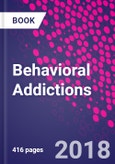DSM-V broke new ground in May of 2013, designating a new disorder called "behavioral addiction." Clinicians immediately wanted to know: how is a behavioral addiction different from an impulse control disorder? What are the criteria for determining that some behaviors are addictions rather than impulses? What, if anything, does this mean in terms of effective treatment?
Behavioral Addictions is the first and most authoritative text ever written on the subject of behavioral addictions. This comprehensive work explains the criteria used to determine addiction, the evidence for identifying assorted behaviors as addictions, and the evidence-based treatment for each.
With contributions from preeminent experts covering an exhaustive list of behavioral addictions, this book is unique in its coverage of behavioral addictions, their criteria, and treatment. It is a valuable and timely resource for any clinician treating addictions.
- A guide to understanding the new DSM-V designation of behavioral addiction
- Defines the criteria for behavior to be considered an addiction designation
- Discusses the evidence for behaviors meeting addiction criteria
- Identifies what is now, likely will be, and is not a behavioral addiction per evidence
- Discusses behaviors formerly considered impulse control disorders
- Presents evidence-based treatment for each behavioral addiction
Table of Contents
1. An Introduction to Behavioral Addictions 2. Behavioral Addiction: The Nexus of Impulsivity and Compulsivity 3. Diagnosis and Treatment of Gambling Disorder 4. Problematic Online Gaming 5. Internet Addiction Disorder: Overview and Controversies 6. Social Networking Addiction: An Overview of Preliminary Findings 7. Food Addiction: Evidence, Evaluation, and Treatment 8. New Directions in the Pharmacological Treatment of Food Addiction, Overeating, and Obesity 9. Sex Addiction: An Overview 10. The Tyranny of Love: Love Addiction An Anthropologist's View 11. Picking Up the Pieces: Helping Partners and Family Members Survive the Impact of Sex Addiction 12. Compulsive Buying Disorder 13. Exercise Addiction 14. Meditation and Spirituality-Based Approaches for Addiction 15. Behavioral Addiction in American Law: The Future and the Expert's Role
Authors
Rosenberg, MD, Kenneth PaulKenneth Paul Rosenberg, M.D., is Clinical Associate Professor of Psychiatry and Public Health at the Cornell University Medical Center - New York Presbyterian Hospital and a psychiatrist in private practice. He graduated from the Albert Einstein College of Medicine and completed his psychiatry residency and fellowship at Cornell Medical Center.
Dr. Rosenberg is a contributing editor of the Journal of Sex Therapy, the author of scientific and lay articles, listed among the Best Doctors® in America and New York Magazine's Best Doctors, a Distinguished Fellow of the American Psychiatric Association and the recipient of medical and public service awards from the American Medical Association, American Psychiatric Association and the Alliance for the Mentally Ill.
Since medical school, Dr. Rosenberg has produced and directed films that have been aired on HBO and PBS affiliates and have been recognized by the Academy for Television Arts and Sciences, the Academy for Motion Picture Arts and Sciences, the American Museum of Natural History and numerous film festivals. He is a recipient of the George Foster Peabody Award. His films include An Alzheimer's Story (coproducer/director, PBS affiliates 1985), Through Madness: The Subjective Experience of Psychosis (producer/director, PBS Affiliates, 1991) Why Am I Gay?: Stories of Coming Out in America, (producer/director, HBO, 1993) Back From Madness (producer/director, HBO.1996), Drinking Apart: Families Living Under the Influence, (producer/director/cinematographer, HBO, 2000) and Cancer (executive producer, HBO,2000) and in producing a current HBO-commissioned project on mental illness in America. http://www.imdb.com/name/nm0742255/
Feder, PsyD, Laura Curtiss
Laura Curtiss Feder, PsyD is a licensed clinical psychologist at Upper East Health. Her psychotherapy practice is geared toward working with adolescents and adults, particularly those who struggle with behavioral addictions and compulsions. Dr. Feder received an undergraduate degree in psychology from Princeton University and then went on for her doctorate in clinical psychology from the Graduate School of Applied and Professional Psychology at Rutgers, The State University of New Jersey. Her doctoral training included working at several New York City hospitals, including Bellevue, Beth Israel and St. Luke's Roosevelt as well as multiple local university counseling centers.
Dr. Feder completed a postdoctoral fellowship at the William Alanson White Institute where she also continues to receive specialized training in working with eating disorders, compulsions and addictions. She has written and presented at professional conferences on the topics of substance abuse, psychological symptoms related to dermatological conditions, camp-based leadership programs and psychotherapy with artists.








